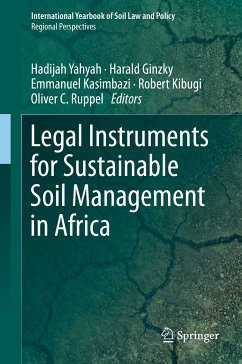
Natura 2000 - A Coherent Nature Conservation Network? (eBook, PDF)
A Proposal for Reforming the Rules on Designation under the Habitats Directive
Versandkostenfrei!
Sofort per Download lieferbar
128,95 €
inkl. MwSt.
Weitere Ausgaben:

PAYBACK Punkte
64 °P sammeln!
This book offers a fresh perspective on the Habitats Directive's rules on designating Natura 2000 - the European biodiversity conservation network. Although the Habitats Directive came into force in the early 1990s, the network is not yet optimally set up and lacks coherence and connectivity. The author examines the Habitats Directive's provisions regarding the designation of Natura 2000 and discusses possible reasons for the EU Member States' ongoing lack of compliance with their designation duties. She reassesses the 2015 REFIT Fitness Check of the Nature Directives to look for the Member St...
This book offers a fresh perspective on the Habitats Directive's rules on designating Natura 2000 - the European biodiversity conservation network. Although the Habitats Directive came into force in the early 1990s, the network is not yet optimally set up and lacks coherence and connectivity. The author examines the Habitats Directive's provisions regarding the designation of Natura 2000 and discusses possible reasons for the EU Member States' ongoing lack of compliance with their designation duties. She reassesses the 2015 REFIT Fitness Check of the Nature Directives to look for the Member States' reasons for not having optimally complied with their designation duties yet. She then analyses the Habitats Directive to reveal elements of non-optimal drafting in its designation provisions. Sensible law reforms that do not interfere with the general framework of the Habitats Directive and which keep in mind the relevant national, regional, and international biodiversity law and policy,as well as the relevant case law will be discussed to this end. As a result, this book presents an enhanced legal designation framework that can support Member States' compliance with their designation obligations. The book finally goes beyond the European biodiversity legislation, also shedding light on the effects of the suggested reforms for the broader biodiversity and environmental law and policy landscape, and concludes that reforming the Habitats Directive would benefit a variety of contemporary areas of law. This book targets academics and policy-makers in the field as it provides a scholarly as well as a hands-on approach to the subject of strengthening European biodiversity law.
Dieser Download kann aus rechtlichen Gründen nur mit Rechnungsadresse in A, B, BG, CY, CZ, D, DK, EW, E, FIN, F, GR, HR, H, IRL, I, LT, L, LR, M, NL, PL, P, R, S, SLO, SK ausgeliefert werden.












